How One Woman's Love Is Transforming Delhi's Brothels
.jpg)
Delhi's G.B. Road is a place where no woman would go voluntarily.
Or so you'd think.
Home to 77 brothels, 4,000 women, and 1,500 children, it is the largest red light area of Delhi, India.
A few years ago, Gitanjali Babbar walked right in. She quite literally knocked on the brothel doors, walked up the narrow staircases, and talked to the people there-- sipped tea with the brothel owners, listened, laughed, and came to know the women as her sisters, their children as her family.
Three and half years ago, she found herself launching Kat-Katha, a nonprofit that's quietly been transforming G.B. Road brothels into classrooms, community centers, and safe spaces for the women and their children to learn, explore creative arts, and come alive with a sense of connection, expression, and possibility.
Last Saturday, we had the gift of hosting a circle of sharing with Gitanjali and learning more about her experiences and insights from stepping straight to the heart of a neighborhood that most steer clear. About sixteen of us circled up for an hour of meditation, followed by Gitanjali's spirited stories, open-hearted Q&A, and emergent conversations over dinner. Some highlights from the sharing are captured below.
Unexpected Beginnings
While working for a health organization, Gitanjali was instructed to survey the brothel women on topics related to contraceptives and family planning. For her, these conversations felt forced and mechanical. She used to wonder, “I don't even know these women. They don't even know me. How am I supposed to ask them such personal and private questions?”
Yet the experience of being in the brothels stuck: “The moment I entered, it was a different world all together for me. [My job] wanted me to ask questions to the women, but I was quiet. The whole one hour. I was just sitting and observing, looking at what was happening right in front of my eyes.”
Her curiosity stirred. Something in her heart shifted.
“Then I started going to every brothel,” she laughs. “And in every brothel, I found some person or another who was waiting to love you.”
After getting off work, she and a couple friends would simply spend their evenings talking with the women and learning their stories-- where they came from and how their lives brought them to G.B. Road.
“I mean, there used to be beautiful chats between the women, talking about everything... I started enjoying that time. I didn't want to go during the afternoon time, when I was expected to go and ask certain questions [for my job].”
The tension between her daytime role as a health professional and evening persona as a caring friend and sister grew stronger. One day, a group of brothel owners prepared for her afternoon visit. When Gitanjali entered, about fifteen women were seated there, ready to reciprocate the very questions she asked of them.
“So why don't you tell us about your personal life. Do you have a boyfriend?” one of them asked.
Gitanjali was silent. She didn't know how to respond.
“When you cannot share your personal stories with us, why do you expect us to share our personal stories with you? And that also, such intimate questions?”
She's right, Gitanjali thought. And she started questioning her own motivations. Why was she coming to these brothels? What was her agenda? What was she trying to achieve?
She told herself, “Now it's time to break that wall and be with them. Do whatever they are doing.”
She began visiting the brothels more frequently. Eventually, she quit her job, and would spend entire days there. The women got used to her presence, and came to look forward to their conversations. One day, one of the women, who was about forty-five years old, pulled her aside. “You come here all the time, why don't you teach me something?”
Gitanjali's heart stopped. She had never been studious. Though her mother had always wanted her to be a teacher, Gitanjali never had that aspiration herself. But she couldn't say no.
“Ok, let's do something,” she replied. And she began bringing in different books and going over the material with this woman.
“Actually, we were just studying together,” Gitanjali chuckles, “I was just making up for all the lessons I didn't learn in school. And we were learning them together.”
From there, other woman in the brothel took notice of these lessons and wanted to join. Then, the children of these women became curious and started asking her to play with them.
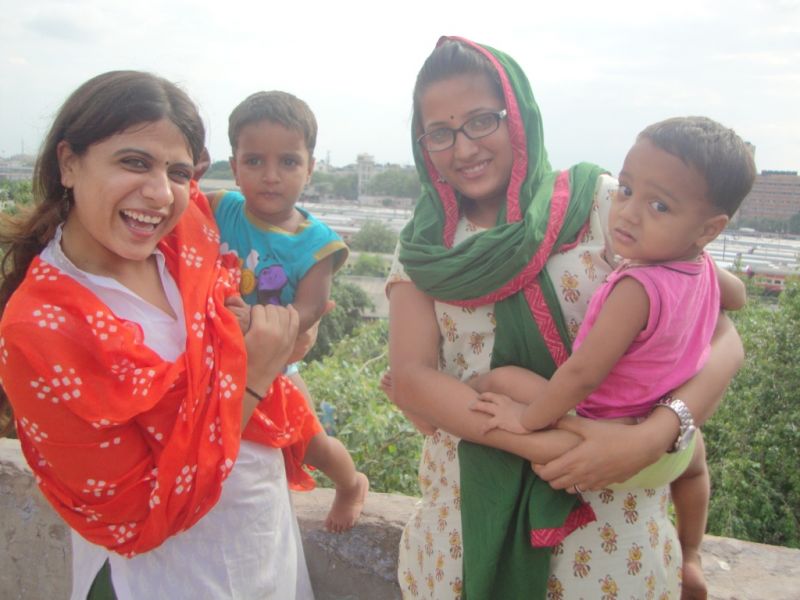
“The brothel started becoming like a family for me. If I was hungry, I used to go into one brothel and they'd give me food. If there is some good smell in some other brothel, I used to go into that brothel and say, 'Didi [sister], I think you're making naan. Can I have one?' So this thing just started evolving... I feel unsafe in Delhi. But if I'm walking in that red light area, I feel that I'm the most safe person in that world. Even if it's 10 o'clock in the night, 11 o'clock in the night. In any of the brothels. ”
Over time, she would return home and share about her experience on social media channels like Facebook. Friends, acquaintances, and even strangers would catch a hold of her stories and want to learn more. Some would want to see and experience it for themselves. Volunteers started coming from all directions.
Today, just three years later, Kat-Katha works with all 77 brothels on G.B. Road, consists of 120 volunteers around the globe, and runs a school for 17 brothel children.
An Agenda of No Agenda
When you listen to Gitanjali talk, you get the sense that it's so ordinary. Then, when you take a minute to realize the content of what she's actually saying, you become struck speechless by how powerful it all is.
When Gitanjali describes the unfolding of Kat Katha and her own ever-evolving journey, there's a twinkle in her eye, yet there's striking sense of humility to it. She doesn't see herself as the founder or initiator of it all; but rather, she shares the stories as if recounting a series of accidents-- a chain of funny coincidences and serendipities that happen to fall in line with her dreams for Kat-Katha and the brothel women and children's prayers.
Eventually, volunteers began asking, “We're doing so many things. We should start making a plan? What's the five your plan? Ten-year plan?”
Gitanjali had no plan. Up until then, she had simply been following the commands of her heart.
As Kat-Katha began to grow, the brothel women and children began to bloom. Women started asking for skills trainings and arts classes. Children wanted to study and learn different crafts and creative activities.
Yet instead of focusing on fundraising and setting up overhead, Gitanjali simply did what she could with what she had. She continued to see the possibility in what was in front of her.
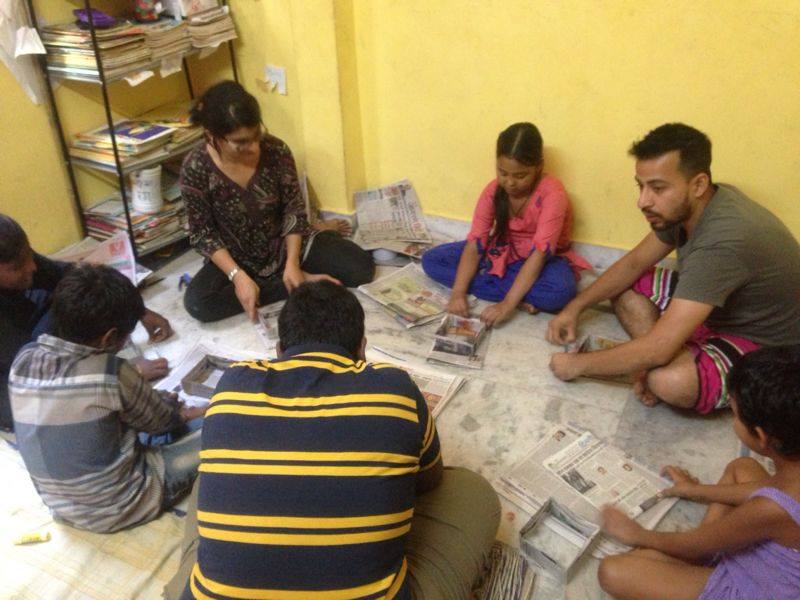
They taught classes directly in the brothels. Someone donated book-binding machines. Companies gave them their used one-sided paper, and Kat-Katha began conducting trainings for the women to bind and craft notebooks from recycled paper as an offering for others.
Rather than needing or seeking out what they didn't have, Gitanjali and her team worked within their constraints to create spaces of learning. The joy and spirit from their sense of connection and co-creation breathed life into their material resources, and left them in a constant state of abundance. And in that state of openness, so much can emerge.
“It became a beautiful journey,” she describes. “Because if there is a student who wants to learn dance, the next day we'll get a volunteer who can teach dance. If there is a student who wants to learn how to play the harmonium, the next day, I'll get a call from someone who says, “I have an old harmonium at home. Do you want to take it to Kat-Katha? So it just became a platform where love and everything is just flowing. And people are just coming and meeting and sharing stories and sharing love with each other.”
Most recently, Gitanjali and her team have been looking to create a hostel to house and school the brothel children in a more stable and nurturing environment. Daughters of the brothel women as young as eleven or twelve can often be sold into prostitution, and children there grow up steeped in the influences of a neighborhood littered with drugs and alcohol. Through another spontaneous sequence of events, she found herself talking with an official the Gandhi Ashram in Delhi. He informed her that she should have a hostel for the brothel children (to which, of course, she agreed :)), and he invited her to pick any of the unused ashram buildings to become that hostel. Awestruck at finding herself in such a situation, she picked one of the buildings, and she plans to renovate it into a hostel with her Kat-Katha family by next spring.
Another time, a group of volunteers had organized an evening of dancing; they would dance for the women in one of the brothels, instead of the women dancing for the clients. The volunteers had organized the gathering and invited folks to come. The day before the event, Gitanjali thought, “Let me just go and check with the brothel owner to make sure everything is okay with her.” So they went to the brothel and found a new owner sitting there.
“We never spoke to her,” the volunteers informed her.
“She's the main owner,” Gitanjali said, surprised. “You've organized an entire event in this brothel for tomorrow night and you've never spoken with her?”
So then they went up and talked with the new brothel owner. And, sure enough, she knew nothing about the event. After a bit of small talk and explanation from Gitanjali and the volunteers, she still wouldn't budge.
Finally, a sliver of possibility entered the conversation.
“Okay. You can come tomorrow, but you have to pass through a test,” she declared. “Sing a song for me.”
At this point in the story, Gitanjali informed us, “I'm not a good singer. But another volunteer who was with us is an amazing singer.” She was a very new volunteer, and so Gitanjali was hesitant to ask her to sing, but the moment she looked at her, the new volunteer said, “Yeah, yeah! I can sing! You please play whatever is there. I'll sing!”
Then Ritu, Kat-Katha's co-founder asked for the ghungroos [ankle bells], and Gitanjali found herself completely at a loss for words. It was ten o'clock at night. Clients were outside the brothel doors insisting on coming in. A group of young college and 20-something-year old girls are inside dancing for the brothel women.
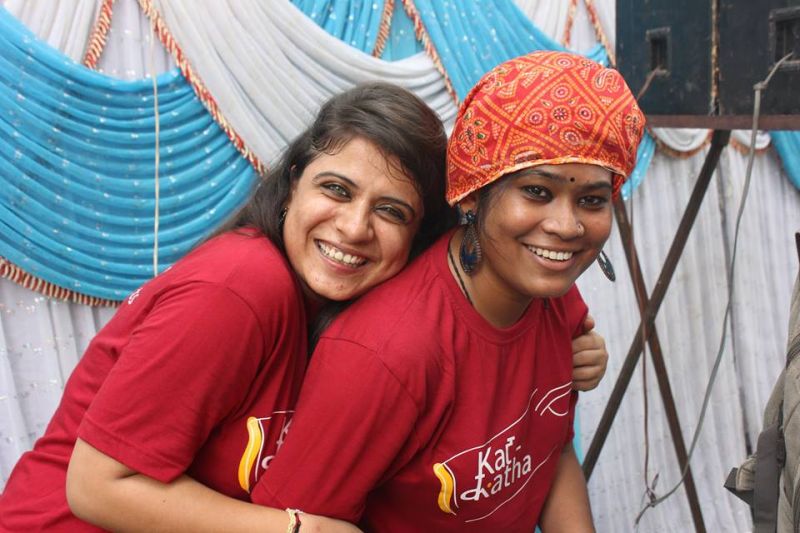
“For one hour, the new volunteer was continuously singing. Ritu was continuously dancing. And after that, the owner also joined in. It was like a completely different world. So the evening we had planned for the next day, it actually happened right there. We didn't expect it.” Gitanjali recounted. “And, like this, everyday some magic happens in that space. And I'm just a part of that space.”
“Just A Part Of That Space”
There's so much beauty in a leader who doesn't view herself as leading. Though Gitanjali and Ritu carry the responsibilities for Kat-Katha, they simply see their work as supporting the co-creation of a space to nurture, educate, and enrich the community.
For a long time, Gitanjali had a dream to turn G.B. Road into a carnival for all the women. “I shared with someone a few months back, that I dream of having a carnival on that road. I really want that these ladies should come down from the brothel and they should just have fun. That's it. Nothing else. There'll be no owner, no client, no police, nothing doing. They should just enjoy their day.”
After incubating the idea throughout the spring, the seeds of a carnival began to sprout.
“In the month of July, I started hearing about it among the volunteers,” Gitanjali laughs. “And when I asked, “What's going on?” the volunteers said, “We're planning a carnival. It's your dream, and we're planning a carnival.””
Over the course of a month, someone designed and printed posters. Another person made a Facebook page. Volunteers in the US and Australia spontaneously launched crowd-funding campaigns. Someone designed Kat-Katha t-shirts, inspired by the children's wishes for a t-shirt.
“I used to get SMS [text] messages on my phone saying this much money got deposited. That much money got deposited. I would say, “What is happening?!””
Then, Gitanjali put in a request at the police station to block the road for the carnival.
“Not possible,” the station's head officer replied. “It's a very busy road. We can't block it. How can you even think of such stupid ideas?”
Not sure what to do, she went to the police commissioner and shared about the carnival and the reasoning behind the day's festivities. Three days later, she received a call from the him. He had scheduled a meeting to discuss the logistics, and invited her to come.
“When I went there, I saw all the station head officers sitting there,” Gitanjali explains. Then the police commissioner went on to instruct all the police officers to support the carnival-- to block the roads and support any necessary event coordination logistics.
Floored by how the doors of possibility continue to swing open, Gitanjali and the volunteers began cleaning the streets. They picked up trash and washed the vandalized walls. Several volunteers had just painted murals in Delhi, and so they began painting a mural on G.B. Road. Gitanjali noticed the head police officer (who had originally refused permission to block the roads) standing there and watching them.

In her playful spirit, she gathered the volunteers and went to invite him. “Sir, we are painting the walls. Do you want to come and see?”
“Yes, yes. It's good. But after your event, whatever was written on the wall before this, you must put it back,” he said sternly.
The original wall was barely legible, with an old advertisement from the National AIDS Control Organization. It read something like, “Please Use Precautions”.
“It's such a beautiful painting, you really think you want to put up advertisements over this particular painting?” Gitanjali asked.
He said, “No, it's government rule.”
I said, “Yeah, Okay. We'll put that.”
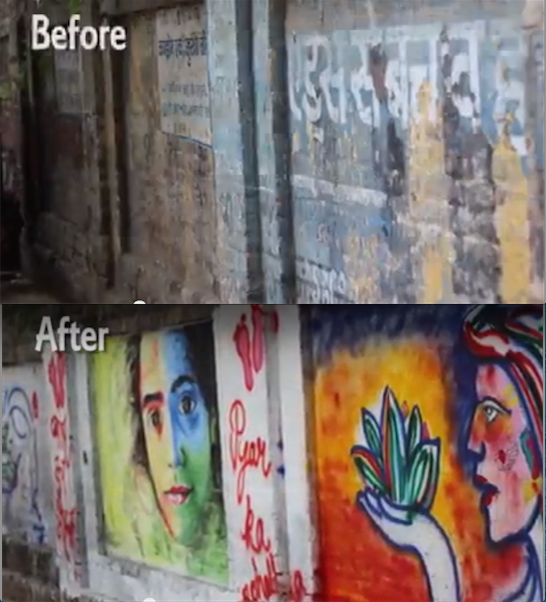
And then Gitanjali lightheartedly inquired, “Do you want us to come paint your police station?”
“No!”
“Okay. We'll not do that. Whatever you say.”
“Keep this business out of the police station. We don't want all this.”
“Okay. Can you just say some motivating words for our volunteers?”
“Yeah, yeah. I'm coming, I'm coming.”
He never came. Yet rather than build defenses and walls, Gitanjali's first instinct is gratitude and acceptance. “He never crossed that road. But it doesn't matter. I think his prayers were there. Because he could've stopped everything. It was in his power. But he didn't.”

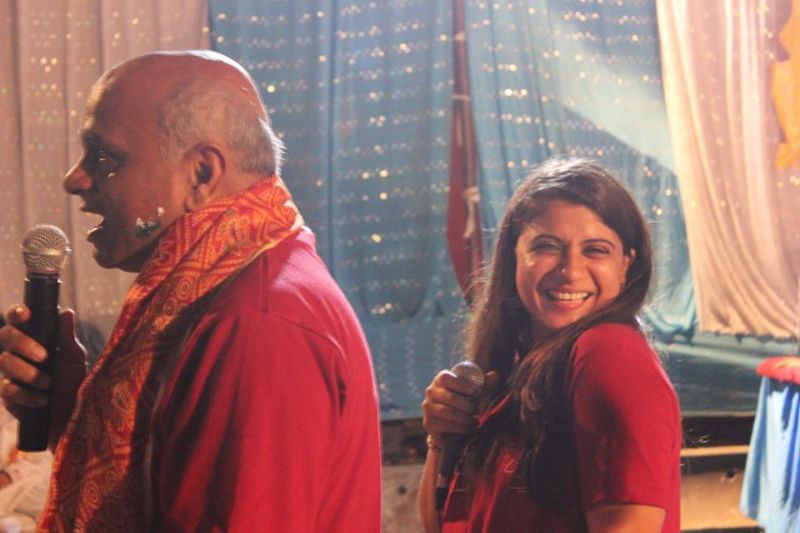
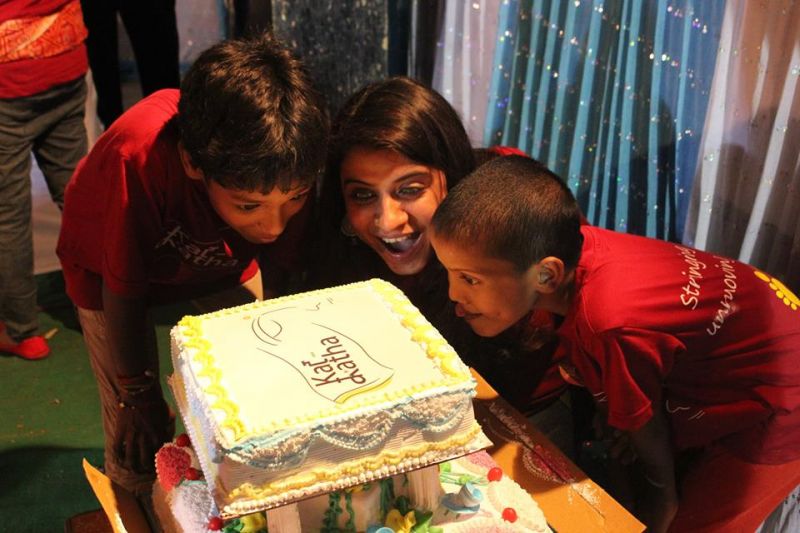
On August 15, the day of the event, all the policemen were inside. They had agreed to be outside, patrolling the premises, but they ended up enjoying some of the festivities themselves. And, just a few weeks ago (while Gitanjali has been in the US), her volunteers informed her that they celebrated Diwali with the policemen. They actually painted the police station, and filled it with candles and holiday decorations.
As she recounts these stories, she mentions, “We call Kat-Katha a magic. ...But it's actually not magic. It's the prayers of these women and the children. Because they always wanted to have such things in their lives.”
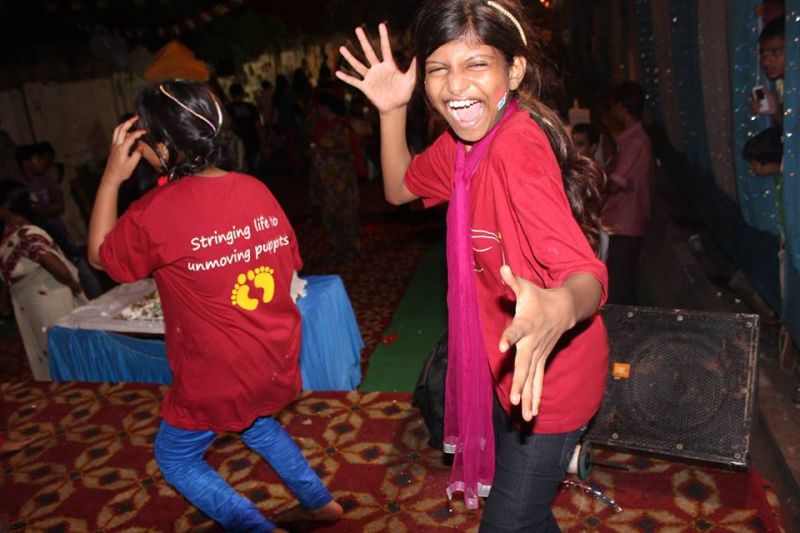
Then she gestures to two of her volunteers in the circle with us and adds, “I would've never imagined someone from Los Angeles would come and stay in those brothels with these women. We've had volunteers from Google visit, and they have huge bodyguards with them. Six feet tall and huge. And these girls are fighting with the bodyguards, saying, “You stay down here, I am safe!” And then when we come back downstairs the bodyguards are asking for stories, saying, “Can I also go upstairs? Can I also see what a brothel looks like?”
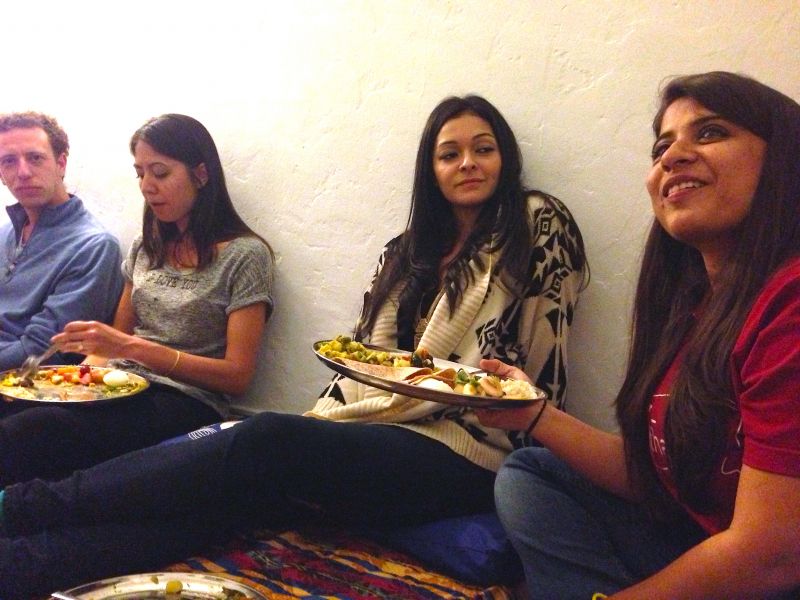
Story after story, the qualities of courage, faith, compassion, and a splash of mischievousness rise to the surface. It's obvious that Gitanjali is the visionary behind all that's unfolding; yet it is also clear that she is simply a “part of that space”-- one in which the qualities of love, joy, education, and compassion are placed at the center, and all who resonate with that kind of human spirit—from police officers to college students, brothel owners to oversees professionals—find themselves stepping up (or stepping aside) to make it all possible.
Unwavering Dedication
In listening to her stories, the elements of faith and spontaneity strike you loud and clear. But it takes a serious blend of courage and determination, and deeper calling to really commit to this kind of work. Not just anyone can walk into a brothel and become its family member. And not just anyone can walk onto G.B. Road and see the possibility and human joy amidst such darkness and despair.
Many of the women in the brothels are trafficked at the age of twelve or thirteen. Those first few years, they are confined to tiny rooms, not even allowed to look out the window. Behind the walls are hidden compartments that only the brothel owners fully knows. Prison-like cells that contain countless girls, kidnapped and trafficked to live out the prime of their adult lives in prostitution. Only when the brothel owner feels that she is too afraid and ashamed to run back to the outside world does she have permission to spend time in the common areas. If a woman has a baby, the baby is often taken away from her—kept on a separate part of G.B. Road— as an ultimatum for her to stay there. She is allowed to see her child once a week, but they are otherwise kept apart.
It's incredible to witness the energetic optimism and indefatigable spirit with which Gitanjali lives out her stories. The way these heartbreaking facts exists as simple details in the backdrop of her stories. Yet it is through these sobering facts and context that one begins to understand the strength of Gitanjali's unwavering commitment and dedication to the women and children of G.B. Road.
At times, Gitanjali will receive a call at one o'clock in the morning from the police station-- one of the brothel women has a conflict there that needs to be resolved. Without a flicker of a doubt, she'll show up at the station and see what she can do. Another time, one of the women and her daughter fell extremely ill and needed to be taken to the hospital. For days, Gitanjali sat by their bed, overseeing their treatment and serving them their meals. The mother ended up dying in her arms.
It's that kind of depth and purity of dedication that makes Kat-Katha seem so effortless. It's that degree of commitment and invisible service that manifests harmoniums and hostels for the children, or that attracts 120 volunteers in just three short years.
As our circle of sharing clocked one hour and then two, and trickled into the later hours of evening, I couldn't help but be sobered, revived, and inspired to re-instill Gitanjali's sense of fearless faith, lighthearted joy, and determined purpose in my own own life. To, above all, tap into that underlying human spirit, no matter how things appear on the surface.

Gitanjali is woman on a mission, a seeker journeying the path, and a sister connecting with family in the most unlikely of places. Amid all the external impact (like her TEDx Talk, Gandhi Fellowship, and 2013 Laureate Global Fellowship), Gitanjali cares most about connecting with the human spirit. She stops to reconfigure her inner alignment. Last February, she partook in a 30-day "In-Turnship" at the Gandhi Ashram in Ahmedabad, where she engaged in daily practices like meditation and sweeping, and held circles with servant ladders from all walks of life. More of her and Kat Katha's spirit can be witnessed in this powerful recap and video of their August 15 Street Celebration "Carnival" of small acts with great love on G.B. Road.
Gitanjali Babbar is the founder and director of Kat-Katha a non-profit that works to empower women in brothels to fulfill aspirations that give them new avenues of sustenance, personal freedom, self-reliance etc. This profile was originally posted on the ServiceSpace blog.
SHARE YOUR REFLECTION
8 Past Reflections


On Dec 13, 2014 Sumit wrote:
Your surname defines everything "Babbar"....thanks to your mom and dad who brought you in this world to bring a change in so many people's lives!!!!! Trust me those people not only include the Brothel women but also people with polluted thoughts/misconceptions/preconceived notions about these women....!!!!! You are our "babbar sher" and your "Roar of Change" has literally brought a tremendous change in the way of thinking of thousand's of people. Thanks again!!!


On Dec 13, 2014 No they are not smart metres wrote:
Deep respect to this Sister who follower her heart to help the women who likely never had a chance, needed to fed there kids, as most of the women in the brothels if had a choice would not be there in the first place and her light brings more then we could imagine. THANK YOU

On Dec 13, 2014 Guest wrote:
If we know that the brothel owners are committing crime and are involved in trafficking young girls why are we not punishing them, freeing the girls and uniting mother and children. I would think that taking victims out of this horrible situation as soon as possible is needed. How can we knowingly let it continue?

On Dec 12, 2014 Kristin Pedemonti wrote:
One of the most inspiring stories yet. Thank you for sharing the Power of Listening and being a part of the space as Gitanjali so beautifully illustrates and lives. She gives us all hope that through following our passions, opening our hearts and being of services can impact lives. And in the most difficult of places. Deeply inspired.

On Dec 12, 2014 Marc Roth wrote:
I love this story. It's hard to explain my past and some of the incredible things I did in order to leave the business Gentlemen's Clubs in Las Vegas. Just working around that atmosphere was so hard. Trying to imagine working around these brothels boggles my mind.

On Dec 12, 2014 Sid wrote:
I simply bow to Gitanjali for her strength, dedication and stamina.



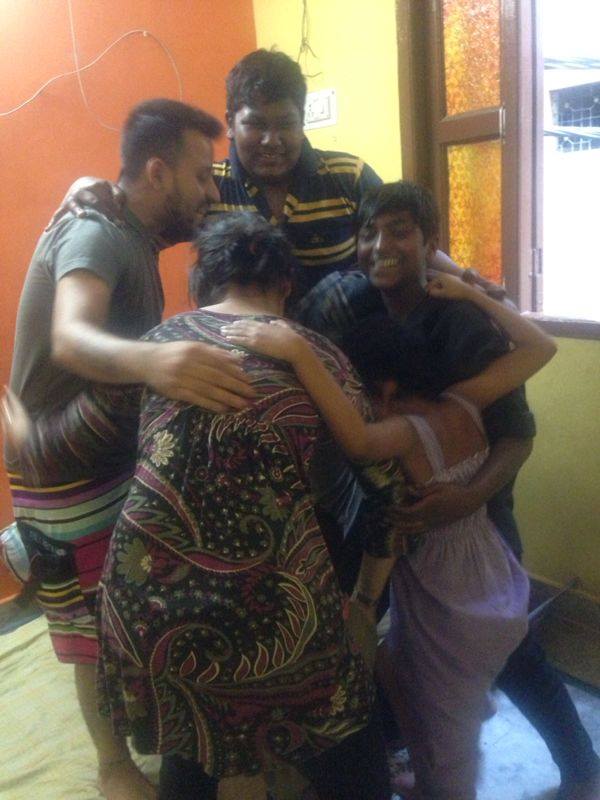
On May 16, 2018 DenisKhan wrote:
Congrats, noble mission! About two decades ago,
my late mother was involved along with a group which used to rehab the girl children
of the prostitutes. A daunting task with the innate hostility of vested interests.
Diwali & Christmas parties were unique as the pimps and madams would orchestrate
taunts and jeers at the social workers. However, some ladies would quietly ask
for assistance. Once, at a family gathering, two young prostitutes came & touched the feet of my
Mom and thanked her for rescuing their daughters.
1 reply: Elaine | Post Your Reply